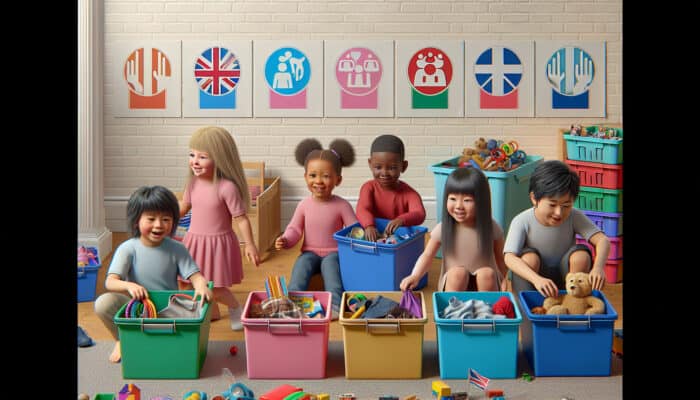Revitalize Your Living Space with Sustainable Decluttering Strategies
Inspire Children to Organize and Donate Thoughtfully

Engaging your children in the decluttering journey by having them sort their toys and clothes can turn a routine chore into a fun and enriching experience. By guiding them to identify items they have outgrown or no longer use, you instill a sense of responsibility and compassion for others. Organizing a family ‘donation day’ transforms this activity into an exciting event where children can choose items to contribute to local UK charities like Oxfam or Barnardo’s. This practical lesson in decluttering not only reduces waste but also fosters community spirit and encourages young ones to appreciate the value of giving back.
Enhance the sorting activity's appeal by gamifying it. Set a timer and challenge your children to quickly categorize their belongings, prompting them to think creatively about what to keep and what to donate. This playful method maintains their enthusiasm and increases their likelihood of participation. Establish categories such as toys, clothes, and books, enabling children to see the direct impact of their decisions—less mess in their rooms and contributions that can assist others facing hardship.
When kids observe their toys or clothing being donated to a meaningful cause, it cultivates a deep sense of pride and achievement. This approach not only declutters your home but also teaches them about empathy, reinforcing the notion that their contributions can significantly uplift someone else's situation. Such invaluable lessons in kindness and sustainability are essential components of their growth, serving them well into their adult lives.
Nurturing Imagination Through Repurposing Old Items
Transforming old furniture or toys into new creations is an excellent way to inspire children's creativity while promoting sustainability. This engaging project teaches them that items can have multiple lives and don’t always need to end up in landfills. For instance, an outdated wooden chair can be imaginatively repurposed into a delightful plant stand, or a cardboard box could become a whimsical playhouse, stimulating their creativity and resourcefulness.
Involving kids in these repurposing projects not only equips them with practical skills but also strengthens their understanding of recycling principles. The pride they experience when turning something ‘old' into something valuable can be immense. Encourage them to brainstorm creative ideas and support them throughout the process, which enhances their self-confidence and problem-solving abilities.
Moreover, these upcycled items can infuse your home with a unique, personal touch, creating a space filled with cherished memories and imaginative flair. Consider documenting these creative projects through photographs and compiling them into an art book, showcasing their creativity and the eco-conscious values you've cultivated together.
Instilling Value in Unwanted Items Through Selling
Utilizing UK online platforms like eBay, Facebook Marketplace, or Gumtree to sell items that children no longer require is a fantastic way to instill a sense of value in their possessions. This process not only educates them about financial literacy but also encourages recycling and sustainable practices, reinforcing the principles of responsible consumption.
Start by explaining how selling unwanted items can clear space in your home while promoting the circular economy, where goods are reused rather than discarded. Assist them in creating listings by taking attractive photos and writing engaging descriptions, which will enhance their digital literacy skills. Additionally, involving them in the negotiation process teaches essential lessons about value and transactions.
Furthermore, the income generated from these sales can be saved for something they desire or donated to a cause they care about, reinforcing the idea of earning money through sustainable practices. This method not only teaches them entrepreneurial skills but also aligns seamlessly with the ethos of clearing a UK home with kids in a green manner, promoting mindful consumption and waste reduction.
Adopting Eco-Friendly Cleaning Practices for a Health-Conscious Home

Creating Natural Cleaning Solutions Together
Making natural cleaning solutions from common household ingredients can be a fun and educational experience for children. Instead of relying on harsh chemicals, consider teaching your kids how to create eco-friendly cleaners using simple ingredients like vinegar, baking soda, and essential oils. This not only results in a safer cleaning environment for them but also lays a solid foundation for sustainable practices.
Begin by involving them in measuring and mixing ingredients. Explain the science behind why these substances work as effective cleaners, turning it into a mini-chemistry lesson in the kitchen. Children often take immense pride in crafting their own cleaning solutions, understanding that they are making choices that positively affect the planet.
Encourage them to utilize these natural cleaners during their chores. This hands-on approach allows them to see the positive outcomes of their efforts, fostering a sense of accomplishment. Additionally, you can discuss how these alternatives are more beneficial for the planet, as they minimize chemical runoff and plastic waste—key principles in clearing a UK home with kids in a green manner.
Embracing Reusable Cleaning Tools for an Eco-Conscious Home
Switching to reusable cleaning tools is a crucial step in reducing waste. Introducing children to washable cloths, sponges, and mops teaches them the importance of sustainability. By contrasting disposable products with their reusable counterparts, you reinforce the value of making environmentally-friendly choices.
Encourage children to select their cleaning tools, allowing them to express their preferences while understanding the rationale behind these decisions. Develop a fun routine where they are responsible for maintaining their cleaning supplies, fostering a sense of ownership and accountability.
Moreover, incorporate educational discussions about the impact of single-use products on waste management and environmental health. These conversations will help children connect their actions to broader environmental issues, making them more aware and proactive about sustainable living practices.
Implementing Energy-Conserving Cleaning Techniques

Teaching children about energy-efficient cleaning practices can have a profound impact on their understanding of sustainability. Demonstrate effective cleaning methods that conserve both water and energy. For example, explain that vacuuming in sections is more effective than starting and stopping frequently, which wastes energy and time.
Transform this into a fun challenge to see how much water they can save while cleaning surfaces or how to use less detergent effectively. Incorporating these lessons into their daily routines reinforces eco-conscious habits. Consider implementing a reward system for using minimal resources during chores, encouraging them to think critically about their actions and their environmental impact.
Discuss the broader context of energy conservation, such as its link to climate change and resource depletion. Children who grasp these connections are likely to grow into adults who prioritize sustainability, making energy-efficient cleaning a critical lesson in the journey towards a greener UK home with kids.
Practicing Waste Sorting and Recycling for a Sustainable Future
Educating children on how to accurately sort waste is a vital skill for embracing a sustainable lifestyle. Teach them about various recycling categories—such as paper, plastics, metals, and organics—to empower them to make informed decisions regarding waste management. You can create an engaging sorting game at home by setting up bins for different materials and challenging kids to sort them correctly.
Make this learning experience interactive by organizing trips to local recycling facilities, where they can observe the recycling process in action. This real-world exposure solidifies their understanding and highlights the impact of their actions. Incorporate discussions about what happens to materials after recycling, helping children comprehend the importance of reducing landfill waste.
Encourage involvement in community recycling initiatives or school programs, further instilling a sense of responsibility and teamwork. By teaching kids the significance of recycling, you guide them to become active participants in their communities, reinforcing the principles of clearing a UK home with kids in a green manner.
Creating Sustainable Storage Solutions for an Organized Home
Innovatively Upcycling Old Containers for Storage
Repurposing old storage containers is both a practical and imaginative way to teach children about sustainability. Rather than purchasing new storage solutions, utilize old boxes, jars, and containers that would otherwise be discarded. Engage children in brainstorming methods to repurpose these items while nurturing their creativity. For instance, a shoe box can be transformed into a decorative storage unit for art supplies, while glass jars can serve as pots for small plants.
Encourage kids to personalize their upcycled containers with paint or stickers, transforming them into unique storage solutions that reflect their individual styles. This hands-on project teaches them that waste can be transformed into something functional, reinforcing the message of reusing and recycling.
Additionally, demonstrate how upcycling contributes to sustainability by decreasing the demand for new materials and minimizing waste. Children who grasp the value of repurposing items are more likely to adopt eco-friendly habits as they mature, perfectly aligning with the ethos of clearing a UK home with kids in a green manner.
Selecting Eco-Conscious Materials for Sustainable Storage Solutions
When choosing storage solutions, prioritizing eco-friendly materials is essential. Discuss the significance of sustainable materials like bamboo, recycled plastics, or organic cotton with your children. Encourage them to engage in the selection process when purchasing new storage items, reinforcing their understanding of the environmental impact that materials can have.
Explore local shops or online retailers together, discussing the advantages of eco-friendly choices. Teach them how products made from recycled materials help reduce waste and conserve resources, strengthening their connection to sustainable practices.
Moreover, create a ‘green checklist’ for any new storage items purchased, including factors like material sustainability, durability, and whether the item is recyclable at the end of its life. This process instills critical thinking about consumption, encouraging children to make informed and responsible choices.
Collaborative Organization with Kids Using Eco-Friendly Storage Solutions
Involving children in organizing their spaces with sustainable storage solutions fosters a sense of responsibility and ownership. Start by asking them to sort through their belongings, deciding what to keep, donate, or repurpose through upcycling. This teaches them the importance of maintaining a tidy and sustainable living environment.
Establish designated areas in their rooms for different activities—study, play, and rest—utilizing eco-friendly storage solutions to keep everything orderly. Encourage them to express their creativity by personalizing their spaces with the upcycled containers they made earlier.
This collaborative effort not only tidies your home but also teaches children the value of organization and sustainability. It reinforces the idea that caring for one’s belongings is an essential aspect of living sustainably, aligning perfectly with clearing a UK home with kids in a green manner.
Educating Children on Effective Recycling Practices
Comprehending Various Recycling Categories for Improved Waste Management
Teaching children about the different categories of recycling is vital for nurturing a sustainable mindset. Start by explaining the various materials that can be recycled, including plastics, paper, metals, and glass. Creating a visual chart that illustrates what can be recycled versus what cannot serves as an effective teaching tool, making the information more digestible for them.
Organize enjoyable activities such as scavenger hunts, where kids search for items around the house that fit into different recycling categories. This hands-on approach reinforces their understanding of recyclables, making the learning process fun and engaging.
Schedule regular visits to local recycling centers, allowing children to witness the recycling process firsthand. Observing the effects of their recycling efforts will motivate them to adopt responsible practices at home and school, contributing to a greener future.
Engaging in Enjoyable Recycling Activities to Reinforce Learning
Involving children in fun activities related to recycling can be a great way to reinforce waste management principles. Hosting craft sessions using recycled materials can spark their creativity; for example, transforming plastic bottles into bird feeders or creating artwork from old magazines.
Organize competitions where children strive to create the most innovative project using recycled materials. This fosters a spirit of teamwork and creativity while emphasizing the importance of reusing items. Recognizing their efforts, such as showcasing their projects at home or on social media, can motivate them to take pride in their contributions.
Additionally, involve them in community clean-up days or recycling drives. Not only do these initiatives teach social responsibility, but they also highlight the importance of recycling within the community, creating a positive impact while reinforcing the ethos of clearing a UK home with kids in a green manner.
Exploring Local Recycling Facilities for Interactive Learning
Visiting local recycling facilities can greatly enhance children's understanding of the recycling process. By taking a guided tour, they can learn how everyday items are processed and transformed into reusable materials. This experience makes the recycling journey relatable and tangible for them.
Discuss the importance of recycling in reducing landfill waste and conserving natural resources. You might even bring materials from home to recycle during your visit, allowing children to actively participate in the process and witness the immediate impact of their actions.
Incorporating discussions about the role of local recycling initiatives in promoting sustainability will help them appreciate the significance of community involvement. This hands-on experience is invaluable in motivating children to adopt responsible recycling habits at home, aligning perfectly with the concept of clearing a UK home with kids in a green manner.
Participating in School Recycling Programs to Cultivate Community Engagement
Encouraging involvement in school recycling initiatives can significantly enhance children’s sense of responsibility and community connection. Schools often implement programs that promote sustainability, and engaging children in these activities fosters a sense of ownership and pride.
Start by attending school meetings to discuss how they can contribute to existing recycling initiatives or suggest ideas to enhance current efforts. Motivating children to take leadership roles in their classrooms can empower them to inspire their peers toward eco-friendly practices.
Additionally, establish a recycling club where kids can collaborate on projects that promote recycling within their school. Such initiatives not only educate children about environmental stewardship but also create a sense of belonging and pride in their community, reinforcing the principles of a green home with kids.
Understanding the Environmental Benefits of Recycling for Sustainable Living
Comprehending the positive environmental impacts of recycling is crucial for motivating children to adopt sustainable practices. Educate kids on how recycling reduces landfill waste, conserves natural resources, and decreases pollution. Use real-life examples, such as how recycling paper helps save trees, to make these concepts relatable and impactful.
Create visually engaging materials, such as infographics or videos, that illustrate the recycling process and its benefits to our planet. This dynamic approach will captivate their attention and reinforce the importance of their recycling efforts.
Encourage them to share what they have learned with friends and family, thereby reinforcing their knowledge and expanding the conversation about sustainability. By understanding the broader environmental impact of their actions, children can grow into environmentally conscious adults, aligning perfectly with the ideals of clearing a UK home with kids in a green manner.
Embracing Gardening and Composting as Sustainable Practices
Creating a Home Garden to Inspire Eco-Friendly Values
Starting a home garden is an exciting way to engage children in eco-friendly practices. This activity educates them about plant growth, the environment, and the importance of sustainability. Involve them in the planning phase—choosing what to plant based on the season and their preferences, encouraging them to take ownership of the project.
Begin with easy-to-grow plants like herbs, tomatoes, or radishes, which can cultivate a sense of achievement as they witness their efforts yield produce. Encourage them to research the plants they select, fostering curiosity about nature and the ecosystem.
Incorporating lessons about organic gardening techniques, such as companion planting and pest management, enables children to understand the benefits of working harmoniously with nature rather than against it. As they nurture their plants, they learn about responsibility and the significance of environmental stewardship, which beautifully complements the principles of clearing a UK home with kids in a green manner.
Introducing the Advantages of Composting for Waste Minimization
Involving children in the composting process is a fantastic opportunity to teach them about waste reduction and sustainability. Start by explaining the many benefits of composting—how it decreases landfill waste and produces nutrient-rich soil for gardening. Together, set up a compost bin, allowing them to help select compostable materials like fruit and vegetable scraps, eggshells, and yard waste.
Make it a regular activity to monitor and maintain the compost, enabling children to observe the transformation of waste into valuable resources for the garden. Discuss the science behind decomposition and the role of microorganisms in composting, blending fun with education.
Encourage them to use compost in their home garden, reinforcing the sustainability cycle as they nourish their plants with organic material. This hands-on experience provides a profound understanding of environmental processes, aligning perfectly with the aim of clearing a UK home with kids in a green manner.
Utilizing Compost for Enhanced Growth and Environmental Stewardship
Teaching children how to effectively apply compost in the garden reinforces the significance of sustainability and waste reduction. Demonstrate how to use compost to enrich the soil, explaining its crucial role in promoting plant health and growth. This practice not only benefits the garden but also illustrates the cycle of life and waste, highlighting nature's interconnectedness.
Encourage children to observe the effects of compost on their plants over time, such as improved growth and resilience. This hands-on engagement instills a sense of pride and accomplishment while deepening their bond with nature and the environment.
Additionally, discuss how composting helps reduce greenhouse gas emissions and fosters biodiversity. As they learn the importance of composting, they become more invested in sustainable practices, seamlessly aligning with the principles of clearing a UK home with kids in a green manner.
Participating in Community Gardening to Foster Collective Environmental Responsibility
Encouraging children to engage in local community gardens cultivates a sense of belonging and shared responsibility for the environment. These gardens often provide opportunities to learn about diverse plants, gardening techniques, and the benefits of growing food sustainably. Sign them up for community gardening events, where they can connect with like-minded individuals and learn from experienced gardeners in their area.
Getting involved in community gardening not only enables children to develop gardening skills but also instills values of teamwork and cooperation. They will appreciate the importance of collaborating to achieve a common goal, whether it’s cultivating vegetables for local food banks or beautifying public parks.
Furthermore, working alongside others in the garden offers an excellent chance for children to learn about local ecosystems and biodiversity. By connecting them with their community and teaching them sustainable practices, you effectively enhance their appreciation for nature and the environment, aligning perfectly with the objectives of clearing a UK home with kids in a green manner.
Implementing Eco-Friendly Home Renovations for a Sustainable Future
Selecting Sustainable Materials for Home Improvements to Promote a Greener Lifestyle
Educating children on the importance of choosing sustainable materials for home renovations can serve as a vital life lesson in eco-awareness. Involve them in researching eco-friendly options such as reclaimed wood, bamboo, or recycled materials. Discuss the environmental impacts of traditional materials compared to sustainable alternatives, helping them grasp the significance of their choices in shaping a sustainable future.
When renovating, allow them to assist in selecting materials, perhaps during a visit to a local eco-conscious home improvement store. This hands-on experience reinforces their understanding of sustainable practices and the role they can play in maintaining an environmentally-friendly home.
Additionally, encourage discussions on how sustainable renovations contribute to energy efficiency and lower carbon footprints. By instilling these principles early on, you prepare them to make informed choices in their future lives, aligning seamlessly with the ethos of clearing a UK home with kids in a green manner.
Incorporating Energy-Efficient Upgrades to Your Home for Lasting Benefits
Involving children in the selection of energy-efficient upgrades for your home can provide them with essential lessons about sustainability and energy conservation. Start by explaining the benefits of energy-efficient appliances, which include lower utility costs and reduced carbon emissions.
When discussing potential upgrades, encourage children to research options together, comparing energy ratings and features to make informed choices. You might create a chart to visually represent energy savings, making the decision-making process more engaging and informative for them.
As upgrades are implemented, explain how these changes positively impact the environment. By understanding the significance of energy efficiency, children develop an eco-conscious mindset that will guide their future choices, aligning perfectly with making a UK home greener with kids.
Engaging in DIY Green Projects for Practical Environmental Learning
Encouraging children to participate in DIY green projects can boost their creativity while advocating for sustainability. Motivate them to undertake projects that enhance your home's sustainability, such as constructing birdhouses, installing rainwater collection systems, or setting up solar panels.
These hands-on projects teach valuable skills while reinforcing the principles of reusing and recycling. Moreover, DIY projects foster a sense of ownership and pride, particularly when they observe their efforts yielding positive environmental impacts.
Encourage kids to present their projects to family and friends, showcasing their creativity and promoting awareness of sustainable practices. As they take pride in their contributions, they will develop a lifelong commitment to sustainability, perfectly aligned with the goal of clearing a UK home with kids in a green way.
Encouraging Sustainable Lifestyles in Everyday Life
Instilling Daily Eco-Friendly Habits in Children for Positive Environmental Impact
Teaching simple daily eco-friendly habits to children is a crucial step toward fostering a sustainable lifestyle. Show them the importance of turning off lights when leaving a room, unplugging devices when not in use, and conserving water during showers or while brushing their teeth.
Establish a rewards system to encourage the adoption of these habits, promoting a sense of ownership over their actions and choices. Regularly discuss the environmental ramifications of their decisions, reinforcing the link between individual actions and broader ecological consequences.
Furthermore, model these behaviors yourself, demonstrating your commitment to sustainability. Children learn significantly from observing their parents, making it essential for you to embody the values you wish to impart. This collaborative approach to eco-friendly living aligns seamlessly with the principles of clearing a UK home with kids in a green manner.
Frequently Asked Questions About Sustainable Practices for Families
What are some effective eco-friendly decluttering strategies for families?
Encouraging kids to sort and donate items, repurpose old toys or furniture, and sell unwanted items through UK platforms can significantly support sustainable decluttering efforts while promoting a sense of community.
How can I teach my kids about sustainable cleaning practices?
Involve children in creating natural cleaning solutions and using reusable tools. Teach them about efficient cleaning methods that conserve water and energy while being considerate of the environment.
What are some creative upcycling storage ideas for kids?
Repurpose old containers, such as jars and boxes, into fun and functional storage solutions. Let kids decorate these items to personalize them, fostering creativity and sustainability.
How can I encourage my children to learn about recycling?
Educate them about recycling categories, involve them in fun recycling activities, and take them on trips to local recycling facilities to demonstrate the recycling process and its importance in fostering a sustainable future.
What is the importance of gardening for kids?
Gardening teaches children about sustainability, plant growth, and responsibility. It provides hands-on experience in caring for the environment, reinforcing eco-friendly practices while deepening their connection to nature.
How can I involve kids in composting at home?
Show children how to compost kitchen waste and discuss the benefits of composting. Engage them in maintaining the compost bin to help them understand the process and the positive impact it has on the environment.
What are some DIY projects for kids that promote sustainability and environmental awareness?
Encourage children to build birdhouses, create rainwater collection systems, or repurpose old items into new creations, enhancing sustainability at home while fostering their creativity.
How can I instill daily eco-friendly habits in my children?
Teach kids simple habits like turning off lights and conserving water. Create a rewards system to encourage them to adopt these behaviors regularly and appreciate their positive impact on the environment.
What are the benefits of participating in community gardening?
Community gardening fosters a sense of community, teaches teamwork, and provides children with valuable gardening skills while promoting environmental stewardship and sustainable practices.
Why is it important to choose sustainable materials for home renovations?
Choosing sustainable materials reduces environmental impact and promotes energy efficiency, instilling eco-awareness in children as they engage in home improvements and contribute to a greener future.
Connect with us on Facebook!
The Article: Clearing a UK Home with Kids Greenly: Eco-Friendly Tips Was First Found At https://birminghamhouseclearance.com
The Article Eco-Friendly Tips for Clearing a UK Home with Kids Greenly Was Found On https://limitsofstrategy.com

